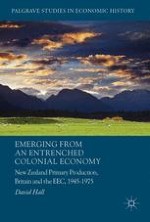2017 | OriginalPaper | Buchkapitel
3. A Brutal Snapping of the Anglo-New Zealand Nexus?
verfasst von : David Hall
Erschienen in: Emerging from an Entrenched Colonial Economy
Aktivieren Sie unsere intelligente Suche, um passende Fachinhalte oder Patente zu finden.
Wählen Sie Textabschnitte aus um mit Künstlicher Intelligenz passenden Patente zu finden. powered by
Markieren Sie Textabschnitte, um KI-gestützt weitere passende Inhalte zu finden. powered by
